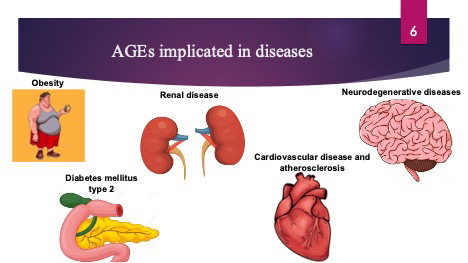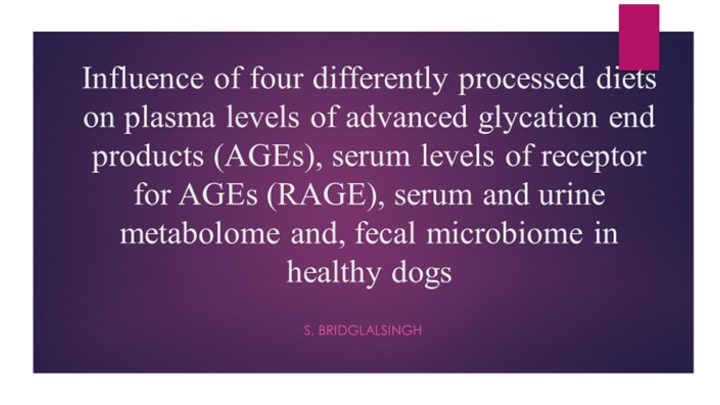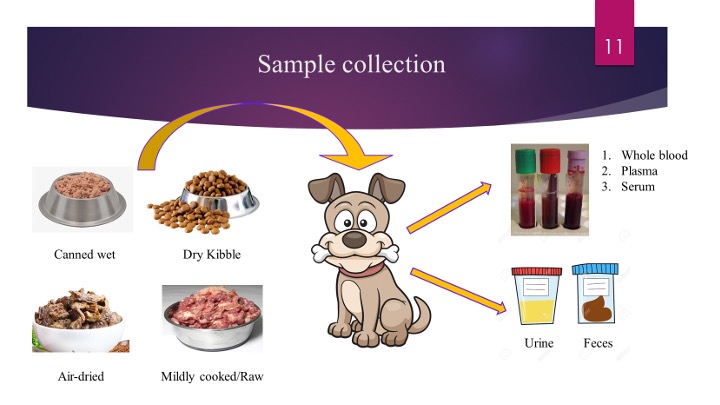Independent Research
CANWI looks at pet food processing:
Humans are being told to eat more fresh foods and avoid processed foods to improve our health. Why? Scientists know that when we process foods, chemical reactions occur that cause the formation of what are known as dietary advanced glycation end products or AGEs. High levels of AGEs in the body have been associated with many human diseases i.e. diabetes, osteoarthritis, Alzheimer’s, cardiovascular disease and yes, even cancer.
CANWI funded research to look at AGEs in pet food. We know that dry and can pet foods are processed, so what are the levels of AGEs in pet foods that our dogs and cats eat each and every day? And if they eat diets containing high AGEs, do their body levels increase like what is seen in humans?
We looked at four differently processed dog diets that contained similar ingredients: 1) dry food 2) canned food 3) air dried 4) minimally processed food and measured dietary AGEs. Similar to what has been reported in processed human foods, our minimally processed dog food had the least AGEs. And when the healthy dogs ate this diet, their body levels of AGEs were the lowest. The gut flora was also affected by the different levels of dietary AGEs.
The findings of this AGEs research in pet foods will soon be published in scientific research. Dr. Siobhan Bridglalsingh, DVM, MHEd, completed her doctorate program working on these AGEs studies and was honored to present some of this data at veterinary meetings.
“I extend my appreciation to the Companion Animal Nutrition and Wellness Institute (CANWI) for funding this exciting and important work and to Dr. Donna Raditic not only as the institute’s liaison but also for being my friend. I will always remember your kindness and words of support at the most difficult times encouraging me to push through, accept the challenges and accomplish my goals.” – Dr. Siobhan Bridglalsingh DVM, MHEd, PhD:



CANWI looks at herbal supplements in dogs and cats:
Two veterinary students looked at an herbs supplement for the management of bladder stones in dogs and cats. Their work was selected to be presented at the American College of Veterinary Internal Medicine Scientific Forum.


CANWI knows coat problems can mean there is a need for better nutrition:
CANWI funded a case study on the effects of pet food protein (essential amino aid content) in a dog with red hair coat, “Newt’s Nutritional Nuisance: A Case of Nutritional Imbalance in a Dog”. This case report was presented by a senior veterinary student at Auburn University College of Veterinary Medicine.
EDUCATION
CANWI supports and funds unbiased nutrition education and programs:
- Provides the public with information on companion animal nutrition, conventional and specialty pet diets, supplements/integrative veterinary care and lifespan wellness from puppies, kittens to the geriatric dogs/cats. This has been accomplished through on-site education forums, daily Facebook posts, Newsletters, and speaking engagements.
- Co-hosted a New York City luncheon with NHV Natural pet Products and offered pet parents and caregivers a unique opportunity to learn from Dr. Donna Raditic, a Veterinary Nutrition and Integrative Medicine Specialist.
- Went to Camp Unleased Group in the beautiful woods of Berkshire, MA to talk about healthier dog diets and provide some unbiased pet food education.
- Sponsored multiple Pet Parent Forums in Knoxville, TN, led by Dr. Donna Raditic, DVM Boarded Nutritionist, who provided attendees with pet food, supplement and health care information.
- Awarded a veterinary technician scholarship for studies in companion animal nutrition to the Vermont Veterinary Medical Association.
- Founders Drs. Donna Raditic and Karen Becker presented The Fresh Food Movement at Superzoo to a standing room only crowd of pet lovers.
- Scholarship recipient, Dr. Danielle Conway, completed her American College of Veterinary Nutrition Residency at University of Tennessee College of Veterinary Medicine funded by CANWI.
- Grant recipient Dr. Siobhan Bridglalsingh DVM, MHED added PHD to her title with her work in dog food and AGEs, funded by CANWI.



Dr. Donna Raditic, provided nutrition lectures as part of our Student Partnerships in Animal Nutrition (SPAN) initiative, to Veterinary Students VMED 9420 at the University of Auburn College of Veterinary Medicine. Attendee quotes:
“Please don’t tell anyone but those were the best lectures I have heard in my four years here at Auburn Vet College… Can I ask you a question about my own cat?
“First I just wanted to say, thank you so much for your lectures in our nutrition class, it was a truly eye-opening experience and I loved hearing your unique perspective.”
“I’m a vet student at Auburn University and part of the small animal nutrition course. While I was studying for the final today, I had a few questions about my own pets.”
